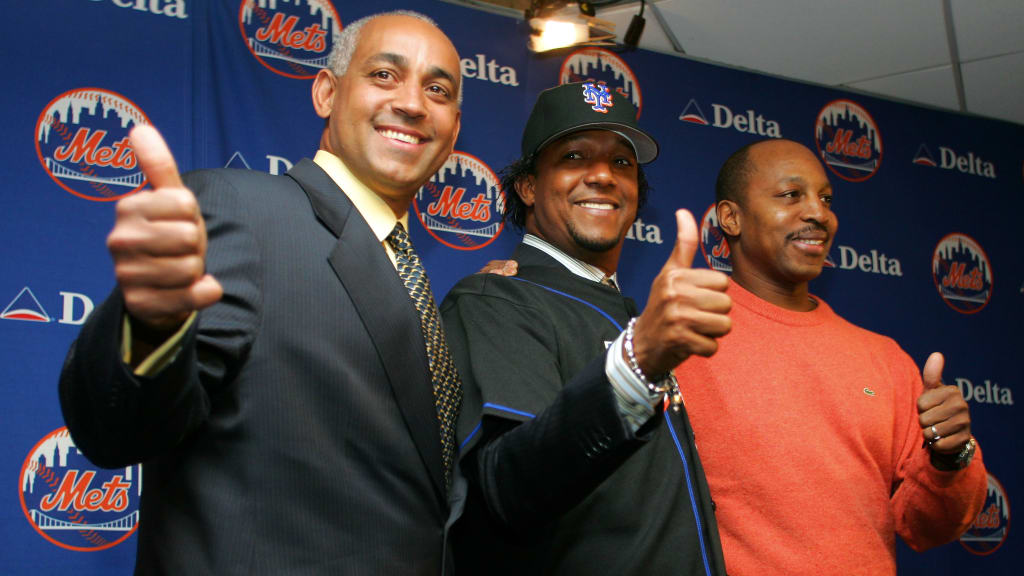
NEW YORK -- Four Mets executives sat in an Anaheim, Calif., hotel room, listening as then-owner Fred Wilpon teleconferenced into the conversation to call for a vote. To a man, the baseball operations staffers understood that a four-year contract for Pedro Martínez probably wouldn’t end well, but it was likely the only way to lure the future Hall of Famer to Queens. And so, to a man, they felt it was worth the risk.
General manager Omar Minaya voted in the affirmative. So did his lieutenants Jim Duquette, Tony Bernazard and John Ricco. With that work done, Minaya called Martínez’s agent, Fernando Cuza, and formally extended the Mets’ four-year, $53 million offer. Cuza accepted.
“We were celebrating, we were jumping up in the suite hugging each other,” Duquette recalled. “And then all of the sudden we got this knock on the door. We froze. ‘Are we being too loud?’ But it was just somebody delivering paperwork for us. … I mean, that’s one of those ones where you never forget where you were, how it came down.”
This took place in December 2004 -- a year when baseball’s annual Winter Meetings were held in Anaheim -- just a couple of months after Martinez had helped the Red Sox end their 86-year World Series title drought.
In Martínez, the Mets executives knew, the team had landed not only a generational pitcher, but one who could change the franchise’s reputation. Even though Martínez was 33 years old at the time, and even though significant concerns existed about the health of his shoulder, the Mets were committed to doing everything within their power to sign him.
At the beginning of the offseason, simply having a chance seemed like a long shot. As one of the most significant members of the Red Sox team that snapped an 86-year drought with a World Series title in 2004, Martínez was a fan favorite with obvious incentive to remain in Boston for the rest of his career. But as the offseason wore on, Minaya learned that Martínez’s camp was growing increasingly frustrated with negotiations. Wary of the right-hander’s shoulder problems, the Red Sox were offering only a two-year deal. That prompted Cuza to reach out to the Mets -- a team on the rise with money to spend -- and let them know his star client wasn’t necessarily committed to returning to Boston.
That Thanksgiving, Minaya flew to the Dominican Republic to meet with Martínez in person and sell him on his vision. He eventually made the pitcher a generous three-year offer, which the Red Sox countered with one of their own. But by that point, Martínez was miffed enough at the Red Sox’s nonchalance that, through Cuza, he made it known that a four-year offer would be enough for him to leave.
Despite their own skepticism of Martínez’s long-term viability, the Mets understood what signing him would mean for their franchise. So at the Winter Meetings in Anaheim, following Wilpon’s vote, Minaya extended the offer.
“We sold him on the idea of what we were trying to do with the Mets and how he was going to play a big part of it,” Duquette said. “We wanted to go spend money on other people. We wanted to go get Carlos Beltrán and Carlos Delgado. He started to buy into this.”
From the Mets’ perspective, it wasn’t just a sales pitch; they understood that acquiring Martínez would give them the viability they needed to land other stars. Sure enough, a month later, New York inked Beltrán to a franchise-record seven-year, $119 million deal -- a deal that neither Minaya nor Duquette believes would have happened had Martínez stayed in Boston. The Mets failed to lure Delgado to Flushing that winter, but they traded for him a year later, while also signing Billy Wagner, Paul Lo Duca and others en route to establishing themselves as a National League powerhouse.
“Pedro basically gave credibility to what we were trying to do, and ultimately what Omar’s strategy was,” Duquette said. “He was like, ‘We can sign these guys. We can be a destination spot. But we have to be aggressive, and we have to sell them on a vision.”
Ultimately, Martínez gave the Mets one-and-a-half superb seasons, making two All-Star teams and winning 21 of his first 30 decisions, before injuries began interfering in significant ways. But his impact on the franchise was, as Minaya predicted, immeasurable.
“We needed that first domino,” Duquette said. “[Players said], ‘Pedro Martínez is buying into the plan? I want to be a part of that, too.’”


